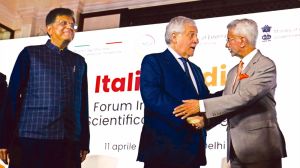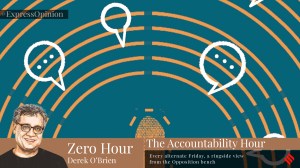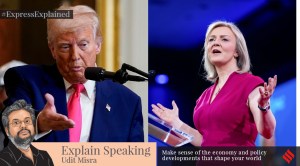Conflicts in Africa | Instability in Great Lakes region and implications for India
Persisting tension in the Great Lakes region has significant implications for India’s economic interests, geopolitical ambitions, and peacekeeping responsibilities. How does New Delhi safeguard its interests and contribute to regional stability?
New Delhi | Updated: April 5, 2025 20:00 IST
 Recently, M23 rebels enter the centre of east Congo's second-largest city, Bukavu, and take control of the South Kivu province administrative office. (AP)
Recently, M23 rebels enter the centre of east Congo's second-largest city, Bukavu, and take control of the South Kivu province administrative office. (AP)— Jamal M. Moosa and Pratibha Poonia
(From civil wars and insurgencies to ethnic tensions and resource-based disputes, Africa has long been a continent marked by conflicts, resulting in widespread instability and humanitarian crises. The region is also becoming a battleground for a global power struggle. In the Conflicts in Africa series, our experts explore the root causes of major African conflicts and their impact on India’s interests. They will also examine prospects for a peaceful future in the continent.)
In a significant political development, the Congo government and Rwanda-backed M23 rebels will reportedly hold direct talks on April 9 in Qatar. It is seen as a crucial step towards addressing the Central African country’s worst fighting in decades.
The talks come on the heels of a recent offensive by M23 fighters in which they captured eastern Congo’s two largest cities – Goma and Bukavu. Eastern Congo has been experiencing the worst conflict since the Second Congo War (1998–2003).
In the first part of this article, we explored how natural resources enabled armed groups to fuel conflict in the Great Lakes Region of Africa, and how colonial policies and military coups affect governance in Rwanda and Burundi. In the second part, we turn our focus to the lingering crisis in the Democratic Republic of Congo (DRC) and explore broader implications for India due to the persistent instability in the region.
Congo’s lingering crisis
The DRC, formerly known as Zaire (from 1971 to 1997), is a vast and resource-rich country in Central Africa with an estimated $24 trillion in untapped mineral deposits. Lake Albert and Lake Kivu have abundant crude oil and natural gas reserves. Despite its immense natural wealth, the country experiences high levels of deprivation, disruption and displacement because of external interference, resource mismanagement, corruption, illegal mining, and conflicts.
Congo became free in 1960 under the leadership of Patrice Lumumba, but he was soon deposed and assassinated. Lumumba’s assassination symbolised the challenges and fragile nature of independent African states. Soon Katanga and South Kasai regions declared secession with support from colonial and external powers. As the Congo crisis deepened, the UN Secretary-General Hammarskjöld tried to negotiate a cease-fire. But he was killed in a plane crash in 1961 while on his way to broker the truce.
In a 1965 coup, Joseph-Désiré Mobutu seized power and renamed the country Zaire in 1971. He established a one-party state, centralised power and suppressed dissent. His three-decade rule is marked by a paradox: despite having abundant natural resources, Zaire faced extreme poverty and inequity.
Mobutu’s regime fell during the First Congo War (1996-1997) caused by a combination of internal and external factors. For instance, the 1994 Rwandan Genocide had a profound impact on the DRC; it ignited ethnic tensions in the country, particularly around Hutu and Tutsi identities. Neighbouring countries like Rwanda and Uganda backed Laurent-Désiré Kabila – leader of the rebel group, the Alliance of Democratic Forces for the Liberation of Congo (ADFL), who overthrew Mobutu and renamed the country the Democratic Republic of Congo.
However, Kabila’s tenure was short-lived. The absence of a political base made Kabila a vulnerable leader dependent on Rwanda’s Paul Kagame and Uganda’s Yoweri Museveni. His attempt to expel the Rwandan troops that helped him capture power alongside the instability, ethnic tensions, and the refugee crisis were some of the major reasons that led to Africa’s Great War or the Second Congo War.
The Great African War
Africa’s Great War was one of the deadliest conflicts in history faced by the DRC between 1998-2003. The war involved various African countries and armed groups. It destabilised the Great Lakes Region and nearly caused the fall of the Congolese state. The war was largely driven by the persistent identity-based politics in Rwanda, Burundi and eastern DRC.
The Great War exacerbated the regional security dilemma and led to the formation of a large and complex network of alliances. Rwanda and Uganda stood against the DRC, whereas Zimbabwe, Angola, and Namibia supported Kabila’s government. Various armed groups such as the Rwandan Hutu militia (Interahamwe), Congolese rebel factions, and local militias also got involved in the war. The involvement of various countries and armed groups turned the region into a volatile flashpoint.
The Great African War illustrates how a festering conflict in Congo became a continental crisis. This period of protracted wars caused ‘state decay’ in many states of Africa. The war also caused a massive humanitarian crisis across the region. It displaced over four million people within the DRC and caused an estimated five million deaths. During the war, massive human rights violations – such as systematic rapes, sexual violence and recruitment of child soldiers – were reported.
In 2001, Laurent Kabila was assassinated and his son Joseph Kabila assumed power. The Lusaka Ceasefire Agreement (1999) and the Pretoria Accord (2002) eventually paved the way for a fragile peace. A transitional government was established in 2003, but eastern DRC remains unstable, with armed groups fighting to control resources.
The region exemplifies Richard Auty’s ‘resource curse’, where immense natural wealth fuelled conflicts rather than development. The Great Lakes Region remains plagued by poverty, weak governance, and recurring violence, underscoring the enduring impact of one of Africa’s most complex and deadly wars.
Implications for India
While instability in the Great Lakes region poses no direct threats to India, it has significant implications for the country’s economic interests, geopolitical aspirations, and peacekeeping responsibilities. The DRC is the largest producer of cobalt – a critical resource for India’s tech and energy sectors. But instability in the region disrupts mining operations, increases prices, and hampers trade and investment opportunities.
India’s increasing focus on Africa, particularly through initiatives like the India-Africa Forum Summit, is affected by violence in the region and undermines New Delhi’s efforts to strengthen partnerships and expand its influence. India is one of the largest troop contributors to the United Nations Peacekeeping Forces, with Indian troops deployed in conflict zones like the DRC. India has lost about 70 peacekeepers in the DRC.
Moreover, as China continues to invest heavily in African infrastructure and resource extraction, India’s relatively delayed engagement in unstable regions may allow Beijing to dominate strategically important areas. To safeguard its interests and contribute to regional stability, India needs to strengthen diplomatic ties and more proactively collaborate with both local governments and international partners for peace and development in the region.
Post Read Questions
The Great African War illustrates how a festering conflict in Congo became a continental crisis. Comment.
How does the concept of the “resource curse” apply to the DRC, and what lessons does it offer for India’s Africa engagement?
Why is the Democratic Republic of Congo (DRC) important to India’s tech and energy sectors?
Why does instability in the Great Lakes region hold strategic importance for India despite posing no direct threat?
How might China’s aggressive investment strategy in Africa impact India’s geopolitical aspirations on the continent?
(Jamal M. Moosa is the Chairperson of the Centre for African Studies, SIS, JNU and Pratibha Poonia is a doctoral researcher at the same centre.)
Share your thoughts and ideas on UPSC Special articles with ashiya.parveen@indianexpress.com.
Subscribe to our UPSC newsletter and stay updated with the news cues from the past week.
Stay updated with the latest UPSC articles by joining our Telegram channel – IndianExpress UPSC Hub, and follow us on Instagram and X.
Must Read
Buzzing Now
Apr 12: Latest News
- 01
- 02
- 03
- 04
- 05


























